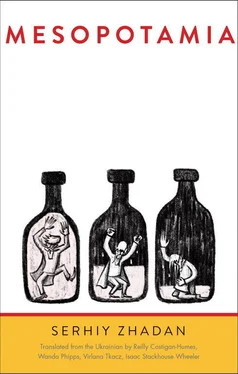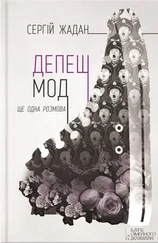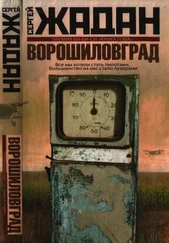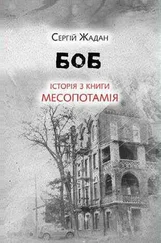I sang and sang as the street outside the window awakened, I sang as the building came to life, and I went on singing, not even trying to get out of bed. “I guess now I know what it means to be unhappy in love,” I thought, despairing. “It can be painful, and it can put you in a rotten mood. Who would have thought? Who could have foreseen it?” Meanwhile, there was more and more sun, and the voices were getting more and more grating—the building was filling up with them, so I simply didn’t have any more time for my suffering. I liked this building. It was like an electric organ. In the mornings, I’d wake to the workers stretching a cable along the cold, damp asphalt and connecting it to the blue waves of electrical current running through the apartment block. The doors were always open, and cold drafts pooled in the hallways, swaying like seaweed as soon as anyone ran inside. After midnight, when everyone was already asleep, if you listened closely enough, you could catch the chittering of mechanical alarm clocks, the dripping of water in the kitchens, the whispering of drowsy pigeons on the roof, and the women sighing quietly in their sleep, as though somebody was tuning all the cords and antennas, preparing for a concert staged to celebrate a holiday. In the early morning, the building would be set in motion and the first sounds would emerge—brisk air would whip through the windows and rooms like breath through woodwinds, the floors would creak, perky radio voices would echo, knives, frying pans, razors, and hair dryers would chime in as well as some toasters, irons, and loud ringtones, anchormen would deliver the latest news in their sweet, reassuring voices; you could hear dishes, you could hear water, kisses and whispers, people humming marches and reciting prayers, running giddily down the stairs, which finally woke all the balconies and hallways from their slumber—now it sounded like a piano was scraping across the floor, and you were inside it, in the midst of the deepest sounds, in between the most disquieting notes, listening to the wood and tin, iron and cement, glass and skin that held the floors and ceilings together. When children ran into the building around lunchtime, their high-pitched voices made invisible microphones screech, and booming sound ricocheted off the walls, and this music persisted—wistfully in the afternoon, adamantly at dusk, ecstatically at night—never slackening, never pausing, just going on and on. The music made me want to die.
I got right down to it.
By the evening, alcohol was pooling in my blood, rising like thaw water on the verge of flooding the empty streets of this defenseless city. Everything I had drunk, everything I had dared to ingest, whatever I touched—bizarre mixes and curious combinations of champagne, sherry, and rum (disappointingly, acquiring them was as wild as my imagination turned out to be)—all that fluid was inside my heart, cooling it down, delaying the inevitable, like graphite in a nuclear reactor, yet it gave me no reason to doubt that the inevitable was waiting patiently for me, just up ahead. I loved myself too much to have any experience with abusing alcohol, but I was too cocky to call it quits. I went to a bunch of shady places, stopped by all the basements and burrows she’d mentioned earlier, paid the Arabs a visit, stuck my head into the Vietnamese joint, became best buddies with the guys that worked at the McDonald’s, strolled into the TB clinic and drank, arms intertwined, with the patients, ordered champagne at Health, the local sauna, lost consciousness in a dark basement across from the synagogue, regained it at a family restaurant (the waiters were busily setting up for some kid’s birthday party the next morning) by chasing milkshakes with herbal liqueur, asked for directions at the pizzeria, died from cognac fumes in a bar run by some Georgian dudes, and resurrected myself with some Madeira in an empty supermarket. I was hanging in there, doggedly drinking her health, insisting that everyone praise her phantom profile, drink to her voice and her skin, and to the hairdresser who conjures up cosmic landscapes out of her unyielding hair. I stood there, wobbling like a cabin boy, and butted into conversations with learned proofs that no other woman in these parts had such green eyes, none of them could unleash a string of curses and then ask for forgiveness as eloquently as she could, and none of them had such high heels, such thin wrists, and such a thrilling biography. It’s odd that the TB guys didn’t beat me up. It’s astounding that the Vietnamese people didn’t mug me. It’s nice that I got thrown out of the McDonald’s. I only had a few hours left to live and I was determined to get something out of them, but I just couldn’t.
She found me on the steps inside our building, leaning up against the door and blocking the entrance. She was angry and then scared. She hoisted me in her arms as best she could and carried me up the stairs. She was still lugging me along when I woke up; I tried to use my cellphone as a flashlight and get a better look at her, but just wound up dialing some random numbers, made what I thought was a good joke about her name—no, I’m positive it was a good one—asked her to marry me, and hung on to her, tenderly, at least I’d call it tenderly, hugging her with one arm and holding the railing with the other. She sat me down in the kitchen and told me to shut my trap, walking around and trying to decide what to do with me. At first, she thought about calling my mom. Then she decided to make me some strong tea. Then she got all anxious, suggesting we try to flush my stomach, hook me up to an IV—take a sleeping pill, take some vitamins, drink some cranberry juice, take some potassium permanganate, take some potassium permanganate with cranberry juice, take some potassium permanganate with a sleeping pill, hold the cranberry juice, or take all of them together and wash it down with some tea—no matter how you looked at it, she was taking care of me, which caused my heart to start pumping more blood; the liquid that flowed in was pink, what came out was dark, like blood ought to be.
While she was pacing up and down the room, rooting around in cabinets and drawers, Googling cures for alcohol poisoning, and calling her pharmacist and anesthesiologist friends, I started feeling sicker and lonelier. Her kitchen had been prudently filled with all sorts of herbs and spices, vegetables and seafood. I could easily distinguish the smells of cinnamon and cloves, the hot aroma of curry, the piercing scent of black pepper, the overpowering presence of garlic and lemons, the dark spirit of chopped meat, the bright juice of sliced vegetables, the briskness of ice, and the weightlessness of flour, the bitterness, resignation, and irrevocability of steak, the ghostliness of vinegar, the daydreams of soy, and the delirium of tomato sauce. The smells multiplied, swarmed above me like demons, nestling into my lungs and constricting my throat. They encircled me like an army besieging a fortress; they formed bizarre constructs above me, taking on curious shapes, baffling and suppressing me. My life smelled like frozen fish and my death will be tinged with the scent of Chinese mushrooms.
I was getting sicker and sicker. The sheer saturation of smells was killing me—and their overabundance was making my death an agonizing one. “Just not here,” I commanded my body. “Not at her place. Go on home, don’t bother her anymore, get the hell out of here,” I whispered to myself. “Just not here.” At that moment, she opened the fridge and I died.
Then she was standing over me for a while, holding my head under a cold stream of water. I turned my back to her, tried getting up and swatted her hand away, but she persisted in washing the pain and blackness of this world out of my body, holding me down and whispering life-giving words. Her clothes were completely soaked—I realized that she must be cold and that all this nonsense was the last thing she needed in her life right now and that I was being a real piece of shit. This realization opened the floodgates; tears came rolling down my face, mingling with the cold water on my skin. “What’s wrong with me?” I thought, in a state of utter despair. “Why’d I have to go and screw everything up? What should I do now?” I said I was sorry and told her to let me go, pretending I was doing just fine, lying about how much I’d actually drunk that night, asking her to pour me another, coughing up some champagne and coke, coolly complimenting her haircut, and suavely inviting her to join me in my bed. She listened patiently to all my rambling, giving me a gentle smack upside the head whenever I started sharing my views on premarital sex, shivering ever so slightly in her wet shirt, and cracking a cool little smile in response to all my propositions.
Читать дальше










